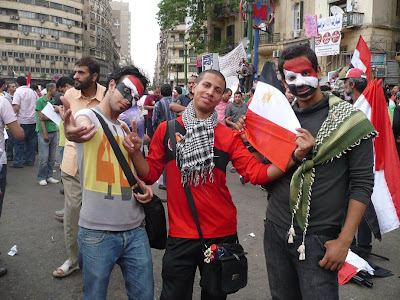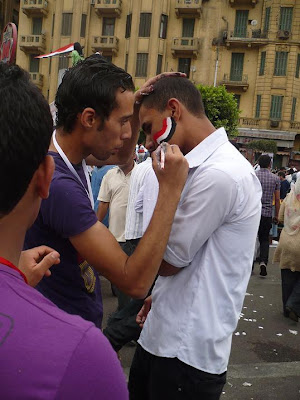
Midan Sayeda Zeinab is a working class neighborhood close to downtown Cairo.
After a koosharee dinner next to my hotel, my friend Mohammed Aly, his friend and colleague Ismail and I walk to the burned police station around the corner. During the revolution, more than one half of all Cairo police stations were systematically burned by the people. As we approach the burned out edifice, I see a vendor on the side. His wares are covered and tied up for the night.
Amr, the youthful vendor, is perhaps in his mid 20s. He sports a scalp of short, curly hair drowned in gel. He is in a dark T-shirt and slippers.
“See, this WAS the police station. NOW, it’s the WC (toilet),” he explains as he unleashes a loud laugh. He seems delighted. A little too delighted. Like a man who had exacted his revenge and now was experiencing
shadenfreude.
Amr points to his head and shows me a gash the size of a quarter. A scab has formed already, but it is recent. Amr spent a year wara al-shams or behind the sun. Street slang for prison. For what? The police saw him as a trouble maker and arrested him one day.
“The police wanted to buy a small item from me for 4LE, but then return it the next day and demand their money back.” If they do this repeatedly, “How do I eat?”
He laments his run-ins with the law. “My luck is bad.”
With six sisters and his widowed mother to support, Amr is at the stand daily. In the evenings, he and his younger brother take turns keeping vigil for thieves. He puts his hand underneath the blanket and shows me a knife about a foot long—Crocodile Dundee size.
When he learns that I am originally from China, he wants to do business with me. I quickly explain that I know nothing of trade or business. Amr then offers me Hasheesh, or marijuana. He then requests a gift from me—a machine that can roll joints. I tell him that I’ll look into it.
Amr shows me two tattoos; a coiled snake on his arm. The second one on his shoulder blade is a woman. Who is she? A former lover? A pop star?
As we leave, my friends walk a little faster than me. With the concern of an overprotective den mother, my Egyptian brother Mohammed Aly warns me, “Take care! There is no government now, no police. He deals in drugs. He is not a educated man. Take care!”

President Hosny Mubarak is being erased from all around Cairo, starting with the eponymous Mubarak Metro Station. The station is now being called
shoohada "Martyrs Station" after the brave souls killed by
Baltageya (government thugs) during the revolution.

Mohammed Aly, my Egyptian brother poses next to a sign in the metro station that declares, "We build the future."












